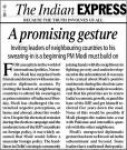The flutter over Modi's invite

You don’t say!
Darius Nakhoonwala
It is hard to say who, Pakistan or Indian leader writers, were more surprised by Narendra Modi’s invitation to SAARC heads of state and government to come for his party on the 26th when he is sworn in as Prime Minister. The former went off into a tailspin and the latter squawked like hens disturbed while laying an egg.
It was such a cunning move that even the Hindu was obliged to offer grudging praise but read too much into it. Calling it a “shock and awe tactic” the paper said “the invitation was clearly meant primarily for Prime Minister Nawaz Sharif of Pakistan.” Clearly? Really? “The invitation is rightly seen as an olive branch …it is an assertion that Pakistan now has to deal with a powerful new leader in New Delhi with a decisive mandate, and that the onus is now on Pakistan to show that it wants friendly ties.”
It went on over-analysing the invitation. “The second clear message is to South Asia and the larger region, including China, that under the new leadership India intends to be proactively engaged with the region… The third message is meant for regional parties in Tamil Nadu and in West Bengal that, allies or not, they can no longer dictate terms on foreign policy.”
The Indian Express went into the same analytical mode but took the low road to go there. “…Modi has challenged the entrenched negative perceptions, at home and abroad, about his worldview.. it was widely assumed that Modi would follow a muscular foreign policy... The hardliners in Delhi’s strategic community were both anticipating and advocating that Modi stop making nice to the neighbours.” Making nice? Such bad English.
It went on. “The Western media.. had whipped up concerns around the world that a nuclear confrontation between Delhi and Islamabad was inevitable if Modi became the PM…Modi’s terrific move even before he takes charge as India’s PM should help generate a more realistic appreciation of India’s foreign policy trajectory in the coming years.” No, man, nothing of the sort. This was just Modi being Modi – thinking in very simple terms.
The Telegraph started its edit with an epic waffle of 65 words. Only after it had gargled fully did it get to the point. “The decision…shows that Mr Modi wants to restore India’s neighbourhood to the focus of the country’s foreign policy… The move is also significant in that it shows a desire on Mr Modi’s part to leave behind the baggage of the past and set an uncluttered new agenda.” Then another epic waffle followed. I will spare you from it.
The Economic Times, which was the only business paper to write an edit the very next day, got it mostly right. “By inviting the leader of Pakistan to his swearing-in, Modi signals cessation of hostilities within and willingness to cooperate with Islamabad…by reaching out to Dhaka, he signals peace... This single act of political astuteness will not banish the apprehensions that India's minorities have about the country's new prime minister. But it certainly works to take the edge off their wariness.”
The Hindustan Times, for reasons not wholly clear, chose to write a uni-dimensional edit, that dimension being the reaction of the Tamil parties. It went on and on about this aspect, writing almost 450 words on this one theme. “… the Tamil parties are up in arms... This is posturing at best… When the civil war in Lanka was at its height, we did not see too many tears being shed by the Tamil parties…The new prime minister is not likely to address the Tamil issue for quite a while…So, we can only assume that this is simply grandstanding.”
The Pioneer, after noting how surprised the commentariat was, made some sensible points. “…The Prime Minister-elect has send out the strong message that he looks forward to India's enhanced interaction with countries of South Asia... the invite seeks to prepare the ground for a conciliatory approach that takes into consideration the sensitivities and concerns of India… while the Shiv Sena favours a tough stance against Pakistan…MDMK leader Vaiko wants the invitation to Mr Rajapaksa revoked…But neither of these leaders should have any problem if greater interaction…can lead to a resolution of their grievances...In a broader context, Mr Modi's initiative to invite the SAARC leaders could re-energise the organisation itself.”






